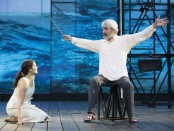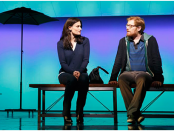Hell’s Kitchen on Broadway
The new musical "Hell’s Kitchen" has made a successful transition to Broadway from The Public Theater and the new version seems to have corrected some of the flaws from before. This juke-box musical with a score by singer/songwriter Alicia Keys and a book by playwright Kristoffer Diaz (The Elaborate Entrance of Chad Deity), is a big ambitious show, a love letter to New York, and inspired by the coming of age story of Keys’ 17th year. It is no longer over-miked by sound designer Gareth Owen, characters seemed to have deepened, the plot seems to have gelled into a distinct coming of age story, and the redesigned set by Robert Brill has moved much of the action closer to the audience. It is a crowd pleaser with the iconic Keys’ songs “Girl on Fire,” “Fallin’” and “Empire State of Mind.” Excitingly performed by its cast made up of a handful of characters and a large ensemble of 15 singer/dancers, its most famous leads Shoshana Bean and Brandon Victor Dixon as Ali’s parents are given less to do as this is the daughter’s story. In the leading role of 17-year-old Ali, making their professional Broadway debut, is Maleah Joi Moon who proves to be an exciting musical personality who can hold a show such as this together. [more]











